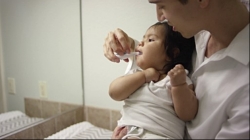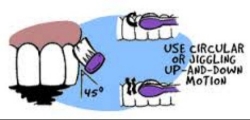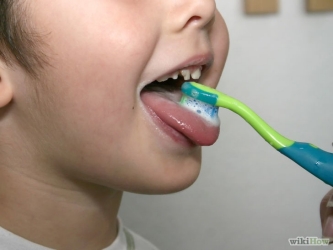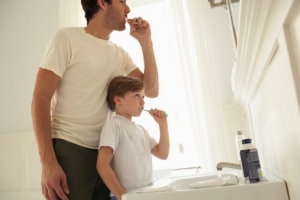
Every parent wants their child to enjoy a lifetime of excellent oral health—and it’s important to give each child the good start they deserve by helping them develop sound eating and dental care habits. Before children accept the responsibility of brushing their own teeth around the age of 6, they need parents to care for their teeth and help teach them the fundamentals of oral health.
Getting on the Right Path
Taking care of teeth and gums is crucial to a child’s long-term health. Baby teeth are important because they help children learn to speak and chew naturally, and hold the place for permanent teeth. But baby teeth are particularly susceptible to decay, which can cause pain and discomfort and also affect the development of permanent teeth.

So it’s important to learn how to care for your child’s teeth. Help your child have a healthy smile by following these tips.
- Get into the habit of cleaning your infant’s gums using a clean, damp cloth or an infant toothbrush. No toothpaste is needed at this stage—plain water will do the job.
- Once your baby develops teeth, you can use a small amount of fluoridated toothpaste—about the size of a "grain of rice" for children under 3 and a "pea-sized" amount for children older than 3. The ingestion of too much fluoride can cause white spots to appear on your child’s teeth, so teach them to rinse their mouth thoroughly and spit out any excess toothpaste.
- Always use a toothbrush with soft bristles. And as soon as your child has two teeth that are touching, it’s time to introduce dental floss. (Look for flossing picks and other products designed especially for kids.)

Practical Advice for Parents
A study published late last year indicated parents want clear and practical advice from dentists and hygienists for the ongoing care of their child’s teeth. With that in mind, here are some points parents should emphasize.
1. Know baby teeth are important. According to the American Dental Association (ADA), primary teeth or baby teeth are important to helping children speak normally and chew naturally. Baby teeth control the growth pattern of the face and hold space for permanent teeth properly. Make sure to check your child’s baby teeth to make sure they’re doing a good job brushing and to confirm their teeth are healthy. Look around their mouth; lift their front lip to check the teeth for white or dark spots, and check the gums to make sure they look healthy. If you notice any problems, schedule an appointment with a dentist as soon as possible.
2. Limit juice. According to the Centers for Disease Control and Prevention, tooth decay is one of the most common chronic conditions among children. Tooth decay in young children is often caused by consuming too much sugar, particularly from sugary drinks that are sipped through the day. One way to protect children’s teeth from decay is limiting the intake of sugary drinks like juice, which can have as much sugar as soft drinks. Children under 4 years old should have a maximum of 4 ounces of juice per day.
3. Serve water between meals and at bedtime. To lessen the negative impact that sugary drinks have on baby teeth, children should drink tap water between meals and at bedtime. Eighty-eight percent of the tap water in Tennessee has fluoride, which helps prevent tooth decay. For 65 years, people in Tennessee have benefited from drinking water with fluoride, leading to better dental health.
4. Teach the right technique. Help your child brush their teeth at least twice a day—especially after breakfast and before bedtime. You will need to brush for them until they are old enough to handle the toothbrush on their own, usually around the age of 6. Even then, it’s a good idea to supervise to be sure your child is brushing thoroughly and using the right amount of toothpaste.

Remind your child that it’s important to clean all teeth, not just those in front. Brush all tooth surfaces (top, front and back), using short, gentle strokes. Pay special attention to back teeth and along the gum line, turning the toothbrush at a 45-degree angle.
Teach your child to take their time brushing. They should brush for at least two minutes. And don’t forget to brush their tongue to remove bacteria and keep breath fresh.

5. Make brushing fun!
Naturally, you want your child to have a positive attitude toward oral care. While explaining the importance of brushing to your child, you can even make it fun with a few special touches.
● Let your child “practice” brushing on a favorite doll or stuffed animal. You might even let them try brushing your teeth.
● Get into the habit of brushing together, demonstrating proper technique and talking about the importance of dental health.
● Set a timer or have your child brush along to a special song to be sure they are brushing for at least two minutes at a time.
● Let your child help choose a toothbrush in their favorite color or featuring their favorite cartoon character. You can also look for different flavors of toothpaste, as long as it contains fluoride.
Additional Resources
Learn more about planning for your child’s dental visits.
American Academy of Pediatric Dentistry’s Parent Resource